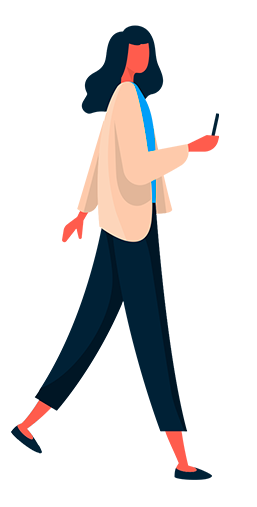Responsible Management Report 2020
7.4.3. We reconnect by being responsible
with our suppliers
(GRI 102-9)
E
S
G
As defined in the Company’s Responsible Business Principles, the products and services offered to customers are always the result of a mutually beneficial relationship with business partners and suppliers. Therefore, the Company works with its suppliers to achieve high standards.
The supply chain is comprised of four platforms: 1) physical assets: telecommunications networks, data centers, experience centers and in general,
all the physical resources through which the Company connects and attends to its customers; 2) IT systems: operating and sales support systems that, connected to the storage and processing capacity, enable the generation of a high level of data and information; 3) products and services: the portfolio of digital products and services that the Company offers to its customers; and 4) customer knowledge: the big data and artificial intelligence platform that is fed with data from the three previous platforms.
The products and services offered to customers are always the result of a mutually beneficial relationship with business partners and suppliers.
Supply chain
Suppliers of infrastructure and big data technologies, and data visualization
Business partners, entrepreneurs and resellers
Technology (OSS/BSS/IT) and security suppliers
Network and infrastructure providers, and technical and customer service partner
Platforms
Data
Products and services
IT systems
Fixed assets
Data
Support activities
Relevant information on the supply chain
(GRI 204-1)
In 2020, 87% of the values granted were to companies established in Colombia. Out of these, 52.1% are in services and works, 18.3% in infrastructure and networks, 14.1% in B2B/B2C solutions, 7.3% in mobility, 7% in IT systems and 1.2% in publicity and marketing.
SUPPLIERS
Foreign
Local 3
Total
292
1.742
2.034
Forty-five companies are part of the Partner Model, of which five are sales agents. The partners are suppliers who have a direct relationship with the customer, such as the installation and customer service teams (experience centers, call center, etc.). At the end of 2020, these partners had in-house staff comprised of 15,625 employees.
Additionally, 199 new contracts were signed and 59 amendments were made to contracts unrelated to the Procurement Model.
199
new contracts
Number of new suppliers established in Colombia
YEAR
2018
2019
2020
AMOUNT
142
210
170

Sustainability in the supply chain
Sustainability has become an essential lever to operate. In this framework, the Company has its Sustainability in the Supply Chain Policy based on international standards including, for example, the UN Guiding Principles on Business and Human Rights, the Universal Declaration of Human Rights, the agreements of the International Labor Organization, the OECD (Organization for Economic Co-operation and Development) Guidelines and the ISO(International Standards Organization) criteria.
According to this policy, all suppliers and partners must meet minimum criteria of responsibility, which they must also transfer to their own value chain. These incorporate issues of compliance with the Law, ethics and responsibility, as well as social, environmental, privacy and security topics, and in the current extraordinary context, actions to face the COVID-19 pandemic with respect to the different stakeholders.





All our actions are based on
Telefónica’s Responsible Business Principles
INTEGRITY
COMMITMENT
TRANSPARENCY
For the Company, it is important to be aware of and manage the direct and value chain, economic, social and environmental impacts, because by providing tools on these matters to
suppliers, customers, entrepreneurs, etc., it can strengthen bonds of trust and expand the network of responsible business ambassadors.
Value Chain School
In 2018, Telefónica Movistar started the Supplier School with the Competitive Business Program module for MSMEs in partnership with the Global Reporting Initiative (GRI),which aimed to contribute to a better integration of MSMEs in a global value chain through sustainability reports with specific sectoral content. This program is developed in Colombia, Ghana, Indonesia, Peru, South Africa and Vietnam.
In the first course, the Company trained ten suppliers on the GRI Standards
The scope of the supply chain was increased to value chain, launching the Value Chain School in which 24 companies.
with the roles of anchor company and implementing partners. In 2020, as part of the Sustainable Value Creation initiative and driving the commitment of the Responsible Business Plan, the scope of the supply chain was increased to value chain, launching the Value Chain School in which 24 companies were trained. In this school, the participating companies were also presented with the possibility of adopting the condition of a BIC company, considering that the GRI Standards are endorsed by the Superintendence of Corporations to adopt the condition.
Diagnostic and
action plans
As part of the strategic Sustainable Value Creation / Sustainability for Design initiative, and with the aim to further strengthen the relationship with suppliers and partners through better knowledge of their management in
sustainability, and aiming to support them in the implementation of these criteria, a pilot project was carried out to assess the management of their organizations in this topic. In this project, 48% of the partners participated, contributing information through a survey on the management of the criteria incorporated in the Sustainability in the Supply Chain Policy. After analyzing the information, the companies entered a phase in which they agreed actions plans for sustainability management to ensure that these matters are adequately, correctly and sufficiently managed at both sides of the relationship.
Acknowledgment of sustainable management
From the customer line of the Sustainable Value Creation initiative, a work plan was designed and implemented with the partners in 2020

with the aim to improve customer service and satisfaction. To achieve this, four training modules were designed on guidelines for service and good conduct in customer relations, achieving that more than 90% of the technical staff passed these courses on the Choose to Learn platform. Similarly, 128 members of technical staff were acknowledged at two events for their good performance during the first months of the health emergency and their contribution to customer satisfaction with the Company’s fixed and internet products and services.
Human
rights workshop
The Company continued to strengthen its suppliers’ capacity in 2020 for them to manage human rights issues in their activities. Through a workshop with 28 partners, supplies were provided for them to make their own commitments to human rights (as a precursor to the formation of their own policy on the topic). Similarly, thanks to the Sustainable Value Creation / Sustainability for Design initiative, the Company achieved that the suppliers identified their level of adoption of
128 members of technical staff were acknowledged at two events for their good performance.
due diligence and designed work plans to start their own processes.
Sustainability
from procurement
For the integration of the minimum responsible business criteria in the procurement of goods and services, the Company has the support of EcoVadis

The Company has the support of EcoVadis to assess the high-risk suppliers performance level in sustainability.
to assess the high-risk suppliers’ performance level in sustainability. EcoVadis assesses 21 criteria, divided into the following four blocks: ethical, social, environmental, and management of their supply chain.
With the aim to facilitate the consultation of the EcoVadis assessment for the purchaser, EcoVadis is integrated with our procurement system.
Likewise, the principles of energy efficiency in the main purchases of products and services that require energy consumption (electricity and fuel) and that can directly or indirectly generate CO2emissions have been incorporated into procurement.
Social suppliers
It is important to highlight that the Sustainable Supply Chain Management Model drives the procurement of goods and services from social suppliers.
- Non-profit organizations and charities recognized as such by current legislation and whose mission includes the aim to encourage the inclusion of people at risk of social exclusion in the job market.
- Entities that are locally, legally recognized as companies that promote this group’s access to the job market and that are subject to specific legal treatment in the country.
Audits
Throughout 2020, four types of audits were conducted on the companies that are part of the Partner Model:
1Labor obligations: Administrative audits that on a monthly basis validate the fulfillment of labor obligations, such as payroll, social security, severance pay, interest on severance pay, bonus, final social security payments, and work accident insurance (partners that carry out high-risk activities).
2Local: Field audits in which the following aspects are validated:
Human resources:
- Selection
- Training
- Hiring and outsourcing
- Identification and equipment
- Labor obligations
- Corporate social responsibility
Occupational health and safety:
- Plan - Comprehensive management of the OHSMS
- Plan - Resource management of the OHSMS
- Do - Hazard and risk management
- Do - Health management
- Do - Threat management
- Check - Management of labor incidents
- Check - Management and results of the OHSMS
- Management with subcontractors
- Road safety
Three audits were conducted in 2020 under this cycle, taking into account the COVID-19 emergency.
3Online (COVID-19): Taking into account the health emergency and with the intention to keep contributing to the partners’ continuous improvement, a process was implemented to validate the prevention mechanisms in the partner companies, as well as compliance with the regulations established by the Colombian Government to manage this emergency.
Sixteen online audits were conducted and the following aspects were assessed:
- Resolutions, circulars and decrees associated with COVID-19
- Labor obligations
- Hiring and outsourcing
- Safety measures for employees
- Prevention and management of cases of contagion
- Action if presenting symptoms of COVID-19
4Global: This is an audit model that is coordinated through an external provider which assesses:
- Business principles
- Hiring/selection process
- Induction process / training / work climate and well-bein
- Staff hiring and management process
- Accessibility
- Outsourcing process
- Occupational Health and Safety Management System (OHSMS) Policy
- Planning (OHSMS)
- Implementation and operation of the OHSMS
- Operating control - Occupational and preventive medicine
- Operating control - Industrial hygiene and safety
- Emergency control
- Verification
- Management of accident assessment and control
- Management with subcontractors
- Road safety
- Electrical risk
- Environmental Management System
- Waste management (it shall be checked by visit to the facilities and documentary control of waste)
- Polluting discharges
- Consumption of materials and resources
- Atmospheric emissions and climate change
- Noise
- Other environmental impacts
Eight audits were conducted online in 2020.
In addition to these four areas of auditing, an environmental audit was conducted through the Environmental Management System, which is described in more detail in another part of this report.
Authorized economic operator
The Company submitted to the National Tax and Customs Administration (DIAN, for the Spanish original) the supporting documents for the requirements to qualify as an authorized economic operator. Similarly, it responded in time to the requirements for additional information. In 2021, the relevant authority will start the auditing process.

